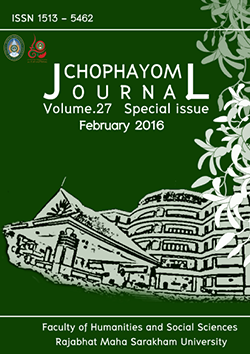Developing Knowledge of the ASEAN Economic Community for Village Headmen in Namsom District, Udon Thani Province
Abstract
The purposes of the research are to design a training curriculum of the ASEAN Economic
Community for village headmen in Namsom District, Udon Thani Province based on the 80/80
standardized criteria effi ciency, to compare the knowledge of The ASEAN Economic Community
before and after implementing the curriculum, and to fi nd the satisfaction of the trainees with
the training curriculum. The research methodology was divided into three phases : 1) curriculum
design and development, 2) curriculum implementation and evaluation, and 3) assessment of
the trainees’ satisfaction. Phase 1 focused on designing and developing a training curriculum
through three steps of the curriculum assessment : one to one testing, small group testing and
big group testing. The target population was forty four village headmen in Banpue District,
Udon Thani Province. Phase 2 focused on implementing and evaluating the curriculum.
The target population was thirty headmen in Namsom District, Udon Thani Province. MANOVA
( Repeated Measure) was employed for comparing the results of curriculum implementation.
Phase 3 was to assess the satisfaction of the trainees with the training curriculum. The research
fi ndings showed that the average level of the needs for developing the knowledge of the ASEAN
Economic Community was high ( =3.87 ) The average index of the appropriateness of the
curriculum assessed by the experts was high ( = 4.82). The IOC index of the curriculum was
1.00. The average level of the accuracy and appropriateness of lesson plans was high
( = 4.88). The average level of the accuracy and appropriateness of an profi ciency test was
high ( = 4.70) with X.39-.67 diffi culty indices, .22-.78 discrimination indices and .76 reliability
index. Regarding the effi ciency assessment of the curriculum, the fi nding indicated that the index
of the standardized criteria effi ciency was 87.70 / 91.33 %. Additionally, the fi ndings indicated
that the average score of the post-test of the trainees was signifi cantly higher than that of the
pre-test at the .05 level. The overall satisfaction of the trainees with the training curriculum was
at a very high level ( = 4.59 , S.D. = 0.47).






